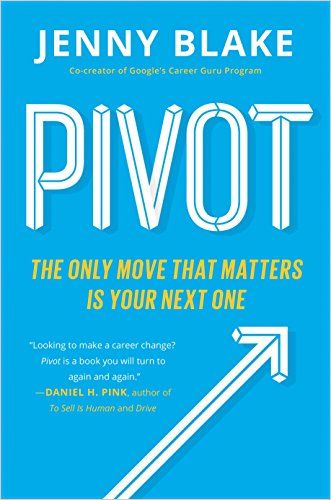Author of Life After College, Jenny Blake provides workable guidance for those early in their careers who want to layout a deliberate path.

Trust Yourself and Leap
While blazing her own trail within Google, consultant Jenny Blake describes how she pivoted toward her ultimate goal of self-employment. Determined to help people realize their career aspirations, Blake shares her framework for making planned, incremental progress toward your near-term career goals. Rather than make a reckless leap into entrepreneurship, Blake sensibly suggests taking small steps – which she, showing wise self-branding insight, labels “pivots” – to experiment, learn and iterate toward your larger goals. Her advice seems aimed at and will resonate most with those early in their careers.
In that regard, and others, Pivot proves a natural follow-up to Blake’s earlier book, Life After College, a well-reviewed, practical guide filled with spritely, workable advice like the counsel she offers here. Each manual works best for people at precise stages of their professional lives: the former for recent graduates and the latter for those who have had a taste of the working world and prefer to go their own way.
Small Steps
Blake touches on a point that arises in multiple contemporary career guidance books: the average employee’s time at a job today spans four to five years. Work, the author explains, will come to you in projects amid the expansion of gig and temporary jobs. She warns that competition and disruption require even the most highly skilled to change frequently in order to remain relevant.
A pivot is a change you make of your own volition when you have reached a point in your career when you are ready for more challenge and impact.Jenny Blake
Blake is adamant that pivots needn’t involve great risk. Most, she emphasizes, won’t necessitate leaving your current job. She underscores that even for a big move – quitting your job to start a business, for example – a series of smaller pivots is safer than jumping all at once.
What You Want
As do many self-help authors, Blake advises starting from your strengths and interests, the things you most value. In line with her consistent message of self-belief, she recommends exploring your inner self so you build your pivots on a solid foundation.
Making choices that are in line with what is most important to you feels affirming and satisfying, even when those choices are difficult.Jenny Blake
She raises this exploration to the moral level by suggesting that you first determine your values – think through your options to gauge how each choice makes you feel. Blake asks, if money didn’t matter, what would you do?
She offers individuals precisely the advice current business books offer organizations: align your decisions to your values. Your process for pivoting successfully, she avows, must put your body and mind in an optimal state, because change brings stress. To cope with that, Blake suggests the practice of mindful meditation.
Specific Vision
With a clear understanding of your strengths and values, Blake says to consider your ideal situation – your vision for a year into the future. Avoid thinking much further ahead, the author warns, because life and work change so quickly. Make your vision inspiring and specific. Start broad, then add specificity.
Money Matters
Blake broadens the scope of her advice to include financial wisdom. She counsels that you must know how much you must save to pursue your vision, where you will earn it and who it will come from. She stresses that you should budget three to five times your monthly rent or mortgage. Have six months of other living expenses in your savings account. If you haven’t yet accumulated that cushion, Blake encourages you to build your savings until you have.
Experiment
Blake urges you to experiment with ideas or products, again effectively presenting organizational advice on a personal scale. Release prototypes, conduct focus groups or test concepts on social media. Pilot your prototypes fast and cheap, she specifies. Remember to analyze what worked and what didn’t. Launch bigger, riskier experiments. Probe the causes of successes and failures.
Launch
When you feel confident enough to launch your enterprise, Blake warns that you shouldn’t expect to find sudden courage. She clearly states that you must simply make the leap. But even within that boldness, the author clarifies, listen to your gut, which complements your brain. Never ignore your feelings. Perhaps her most telling advice, which she says more than once, is not to wait for the perfect moment. Blake makes clear that it will never come.
Only You
Blake returns to her central theme: only you can launch and operate your pivots. Expect no guarantees.
You will know it is time to launch when you are ready to risk failure – knowing that you had the courage to go for it – for the possibility of success, challenge and personal growth.
Jenny Blake
She reminds you to expect to pivot continually and assures you that you will grow more comfortable with the highs and lows, the exhilaration, the anxiety and the challenges of opportunity. Blake admirably insists that insecurity and even failure are natural aspects of any progress.
Lively Guidance
Blake mainly avoids career and self-help gobbledygook in favor of lucid, straightforward guidance. She urges readers to own and respect their individual outlooks, whatever those may be. Her insistence on – and enthusiastic belief in – her readers trusting their vision of themselves walks that rare and difficult tightrope between delusional and inspiring. And that speaks to Blake’s engaging, encouraging tone.
Readers and other writers responded favorably to Pivot. Among many glowing reviews and blurbs, Cal Newport, the author of Deep Work, called this, “a sharply reasoned and immensely practical guide to crafting a meaningful working life in an unpredictable world.“ If such a thing exists, Pivot may well be it.



